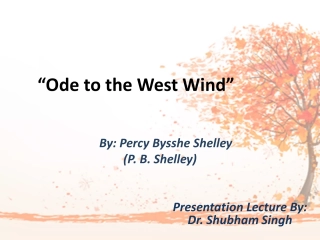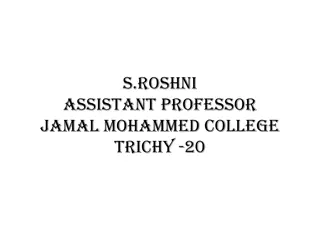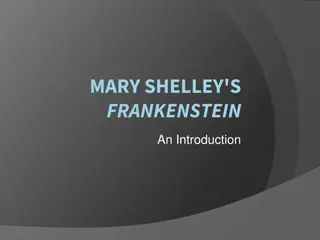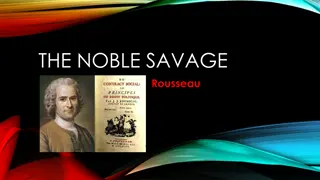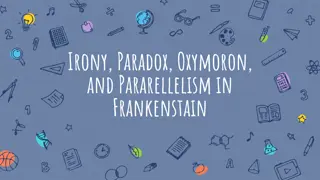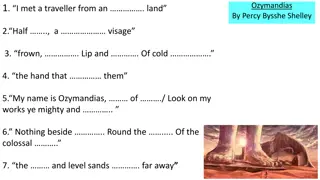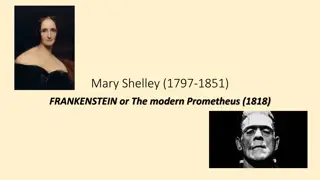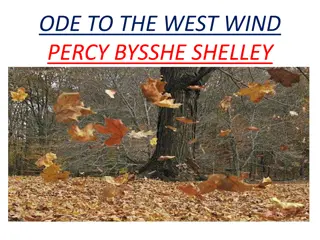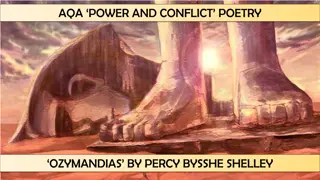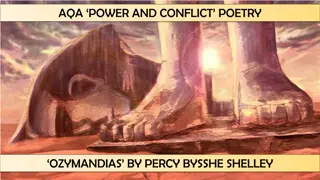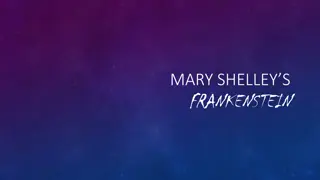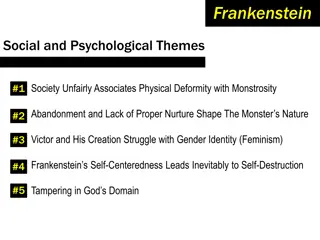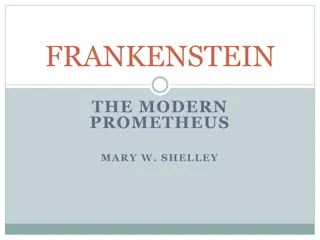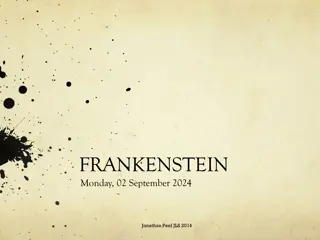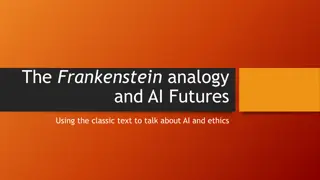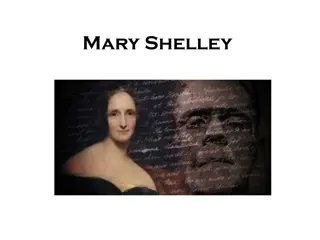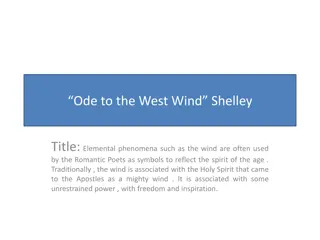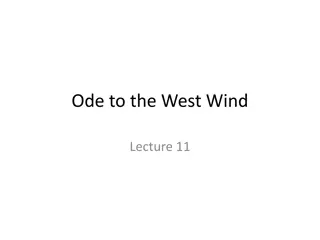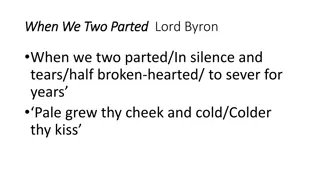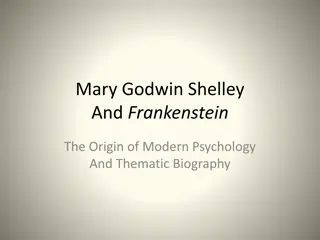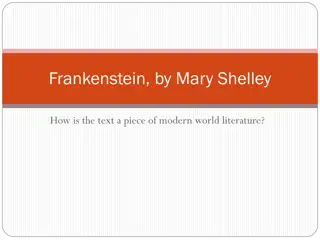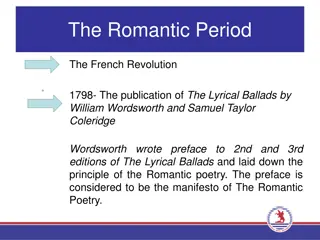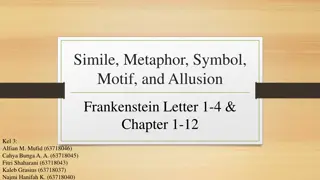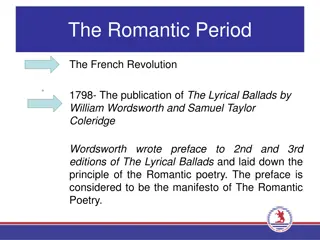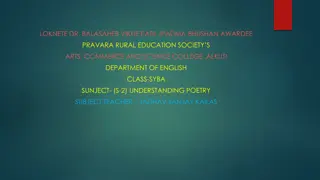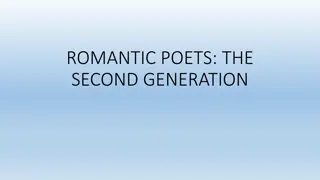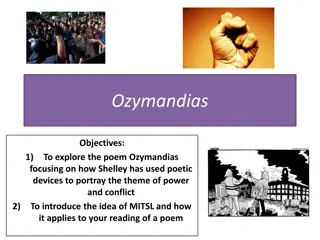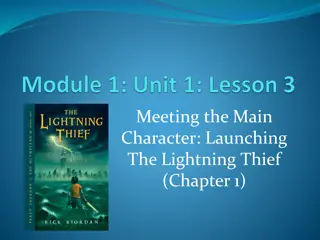Ode to the West Wind
Explore Percy Bysshe Shelley's iconic poem, "Ode to the West Wind," and delve into its allegorical message of reform and the poet as a catalyst for revolution. Discover the impact of the wild west wind on nature and the speaker's plea to be lifted and carried along with it. This presentation lecture
4 views • 13 slides
Analysis of "The Flower That Smiles Today" by Percy Bysshe Shelley
This analysis delves into Percy Bysshe Shelley's poem "The Flower That Smiles Today," exploring themes of transience and impermanence in life. The author's purpose is to depict the fleeting nature of joy and beauty, urging readers to appreciate the present moment. Through poignant verses, Shelley ca
0 views • 18 slides
Mary Shelley's Frankenstein: An Intriguing Introduction
Mary Shelley, born in 1797 to writers William Godwin and Mary Wollstonecraft, had a tumultuous life that greatly influenced her masterpiece, Frankenstein. Her novel, framed within a frame story by Robert Walton, explores themes of ambition, creation, and the consequences of playing god. The settings
4 views • 14 slides
Analysis of "Ode to the West Wind" by Shelley
The "Ode to the West Wind" by Percy Bysshe Shelley is a poetic exploration of the powerful and destructive force of the wind, symbolizing death and decay, yet also representing renewal and rebirth. The poem delves into themes of nature's cycles, the poet's role in promoting change and rejuvenation,
1 views • 52 slides
The Concept of the Noble Savage in Frankenstein by Mary Shelley
The concept of the noble savage, popularized by Jean-Jacques Rousseau and reflected in Mary Shelley's novel Frankenstein, explores the idea that humans are inherently good in their natural state. Shelley portrays this through the creature, who, despite his primitive nature, displays love and kindnes
0 views • 6 slides
Irony, Paradox, Oxymoron, and Parallelism in Frankenstein
Exploring the concepts of irony, paradox, oxymoron, and parallelism in Mary Shelley's "Frankenstein." The discussion covers different types of irony such as situational, verbal, and dramatic, highlighting instances from the novel. Additionally, the concept of paradox is examined, showcasing statemen
0 views • 16 slides
Selection of Poems by Shelley, Blake, Browning, Wordsworth, Tennyson, Owen, and Heaney
A diverse collection of poems by renowned poets such as Percy Bysshe Shelley, William Blake, Robert Browning, William Wordsworth, Alfred Lord Tennyson, Wilfred Owen, and Seamus Heaney. Each poem delves into different themes and emotions, showcasing the beauty and power of poetry through vivid imager
1 views • 15 slides
Mary Shelley and Her Masterpiece: Frankenstein
Mary Shelley, born in 1797, was a talented writer known for her novel "Frankenstein, or The Modern Prometheus," published in 1818. The origin of the story dates back to a ghost story challenge in 1816, inspired by a nightmare. The narrative unfolds through multiple voices, including explorer Robert
1 views • 9 slides
Analysis of "Ode to the West Wind" by Percy Bysshe Shelley
Explore the imagery and symbolism in Percy Bysshe Shelley's "Ode to the West Wind." This romantic poem delves into themes of nature, change, and the power of the wind, captivating readers with its profound musings. Delve into the stanzas that illustrate the wind's dual role as both a destroyer and p
1 views • 10 slides
Exploring Percy Bysshe Shelley's "Ozymandias" in AQA Power and Conflict Poetry
Delve into the world of Percy Bysshe Shelley's "Ozymandias" as part of the AQA Power and Conflict Poetry module. Uncover the themes of power and conflict, understand the historical context, and analyze the symbolism of statues in the poem. Engage with oracy tasks, context summaries, and poem analysi
0 views • 21 slides
Exploring Percy Bysshe Shelley's "Ozymandias": Power, Conflict, and Decay
Delve into the themes of power and conflict in Percy Bysshe Shelley's iconic poem "Ozymandias", which explores the rise and fall of empires through the lens of a decaying statue in the desert. Discover the historical context, poetic analysis, and oracy tasks related to this timeless piece of literat
0 views • 21 slides
Mary Shelley's Background and the Inspiration Behind Frankenstein
Mary Shelley, born in England in 1797, was raised by her father after her mother's death. She was influenced by her father's student, Percy, a Romantic poet with a tumultuous personal life. The complex relationships and events in Mary Shelley's life, including elopements, suicides, and new love inte
0 views • 6 slides
Themes of Society and Psychology in Frankenstein
Society unfairly associates physical deformity with monstrosity in Mary Shelley's novel, Frankenstein. The abandonment and lack of proper nurture shape the monster's nature, while Victor and his creation struggle with gender identity. Frankenstein's self-centeredness leads to self-destruction, and t
0 views • 14 slides
Analysis of Romantic and Gothic Elements in Frankenstein by Mary Shelley
This analysis explores the parallels between Mary Shelley's Frankenstein and Romantic and Gothic literary elements, delving into themes of creation, hubris, nature, and the supernatural. The narrative revolves around Victor Frankenstein's pursuit of creating life, intertwined with Romantic ideals an
1 views • 11 slides
Exploring Contextual Ideas in Frankenstein by Mary Shelley
An analysis of contextual ideas related to the study of Frankenstein by Mary Shelley. Delve into the key connotations, connections with other literary texts, and the enduring resonance of a novel written almost 200 years ago. Understand the significance of the contexts in which literary texts are wr
0 views • 57 slides
Exploring Atmosphere and Themes in Frankenstein Through Letters
The novel "Frankenstein" by Mary Shelley unfolds through a series of letters that set the scene for a haunting narrative. The story begins with explorer Robert Walton writing to his sister about his ambitious voyage to the North Pole. Through letters, themes of loneliness, despair, and the danger of
0 views • 13 slides
Exploring AI Ethics Through Frankenstein Analogy
Delve into the ethical considerations surrounding artificial intelligence by examining parallels between AI creation and Mary Shelley's Frankenstein. This faculty workshop or classroom activity encourages insightful discussions on the implications of AI development and the responsibility that comes
0 views • 12 slides
Exploring Mary Shelley's Life and Frankenstein: An Intriguing Tale
Mary Shelley, the daughter of Mary Wollstonecraft and William Godwin, displayed literary talent from a young age. She met Percy Shelley at 19, leading to the creation of her famed novel, "Frankenstein". The story revolves around Victor Frankenstein, his creation, and the tragic consequences that fol
0 views • 10 slides
Exploring the Origins and Evolution of Gothic Literature
Gothic literature traces its roots back to Horace Walpole's novel "The Castle of Otranto," characterized by medieval settings, supernatural elements, and themes of terror and fear. Writers like Mary Shelley, Bram Stoker, and Edgar Allan Poe further popularized the genre with works such as "Frankenst
0 views • 6 slides
Symbolism of the Wind in Shelley's "Ode to the West Wind
Elemental phenomena, like the wind, symbolize the spirit of the Romantic age in Shelley's "Ode to the West Wind." The poem portrays the west wind as a powerful force of nature, associated with freedom, inspiration, and the Holy Spirit. Through vivid imagery, Shelley explores the transformative and r
0 views • 7 slides
Unveiling the Secrets of Social Media: Insights from Alternatives Conference 2011
Delve into the world of social media with insights from the presentation by Judene Shelley and Leah Harris at the National Empowerment Center Alternatives Conference 2011 in Orlando, FL. Explore the social media landscape, characteristics, blogging, and platforms like Facebook. Discover how to start
0 views • 30 slides
The Influence of the West Wind on Nature: A Visual Journey
The poetic verses of "Ode to the West Wind" by Percy Bysshe Shelley vividly depict the disruptive and transformative impact of the West Wind on nature. Through captivating imagery, the poem portrays how the West Wind stirs the Mediterranean sea from its slumber, creates chasms in the Atlantic Ocean,
1 views • 20 slides
Classic Love Poems & Their Impact on Literature
Explore a collection of classic love poems by renowned poets like Lord Byron, Percy Shelley, Robert Browning, Elizabeth Browning, Thomas Hardy, and more. Each poem delves into the complexity of human emotions, expressing love, heartbreak, and longing through profound verses. The imagery and themes i
0 views • 45 slides
Sponsorship Packages Available for Wales and West Annual Dinner
The Wales and West Annual Dinner, to be held on December 5th, 2019 at The Pump Rooms in Bath, offers various sponsorship packages for companies to promote themselves to attendees and Guild members. Sponsorship options include main sponsor, drinks sponsor, Percy Pig sponsor, PDN sponsor, and raffle s
0 views • 7 slides
Mary Shelley, William Godwin, and Mary Wollstonecraft: Pioneers of Modern Thought
Mary Shelley, daughter of Mary Wollstonecraft and William Godwin, was influenced by her parents' radical philosophies. Wollstonecraft advocated for women's rights and education, while Godwin believed in individualism and anarchism. Their ideas shaped Mary Shelley's literary works, including "Franken
0 views • 19 slides
Analysis of "Frankenstein" by Mary Shelley as a Modern World Literature Piece
Frankenstein" by Mary Shelley, published in 1818, tells the story of Victor Frankenstein and his creation. The narrative unfolds through letters, revealing themes of creation, responsibility, and societal rejection. The novel delves into complex moral questions and explores the consequences of unche
0 views • 13 slides
Enhancing Wellness Through Breathwork Workshop
Explore the profound impact of breathing on overall health and learn effective techniques for symptom control and stress management. Meet experts like Venetia Young and Shelley Murphy who share insights on breathing practices and their benefits. Dive into topics such as childhood asthma, yoga for we
0 views • 21 slides
The Romantics: Poetry and Revolution in the French Revolution Era
The Romantic Period was marked by the publication of "The Lyrical Ballads" by Wordsworth and Coleridge, setting the principles of Romantic poetry. Emphasizing emotions and nature, Romantic poets like Wordsworth, Shelley, Coleridge, and Keats used everyday life and rural language to express their fee
0 views • 6 slides
Literary Devices in Frankenstein: Analysing Simile, Metaphor, Symbol, Motif, and Allusion
Explore the intricate use of simile, metaphor, symbol, motif, and allusion in Frankenstein through excerpts from Letter 1-4 and Chapters 1-12. Dive into the vivid comparisons, symbolic representations, and layered meanings embedded in Mary Shelley's classic novel.
0 views • 11 slides
The Romantic Period: Influence of the French Revolution on Poetry
The French Revolution of 1798 had a profound impact on poetry during the Romantic Period, exemplified by the publication of "Lyrical Ballads" by William Wordsworth and Samuel Taylor Coleridge. Wordsworth's preface to the collection laid out the principles of Romantic poetry, emphasizing the expressi
0 views • 6 slides
Romantic Poetry and Poets of the Romantic Era
Romantic poetry is characterized by emotional spontaneity, self-expression, and a deep connection to nature. Key poets of the Romantic era include William Wordsworth, S.T. Coleridge, P.B. Shelley, and John Keats. Their works reflect themes of imagination, childhood, and individual feeling, shaping t
0 views • 8 slides
The Second Generation of Romantic Poets: A Revolution in Poetry and Ideals
The second generation of Romantic poets, including Keats, Byron, and Shelley, rebelled against societal norms, championing freedom, individuality, and social change. Their poetry reflects a struggle with language's limitations in expressing profound emotions and ideas. Percy Bysshe Shelley emerges a
0 views • 10 slides
The Impact of Technology: Reflections from Frankenstein
Living in rapidly changing exponential times, the influence of technology is profound. Through an extract from Mary Shelley's "Frankenstein," we delve into the consequences of scientific advancements. Victor Frankenstein's creation, brought to life through technology, elicits a range of emotions and
0 views • 6 slides
Exploration of Power and Conflict in Shelley's "Ozymandias
Delve into Percy Bysshe Shelley's sonnet "Ozymandias" to uncover how poetic devices are wielded to depict themes of power and conflict. Unpack the concept of MITSL and its relevance to interpreting poetry. Reflect on the grandeur of the ancient city and the fallen ruler represented by the broken sta
0 views • 15 slides
Exploring "The Lightning Thief" Chapter 1: Meeting the Main Character
Dive into the first chapter of "The Lightning Thief" through engaging activities like Triad Talk Expectations, Vocabulary Learning Targets, and making inferences about Percy. Understand the importance of key words like inference and embark on a journey to explore Percy's character as the narrator of
0 views • 15 slides
Public Safety Procurement Updates and Stakeholder Engagement Details
Stay informed about the latest updates on public safety procurement contracts, including radio rebidding, contract expiration, new contract numbers, and stakeholder engagement opportunities. Participate in the Washington Stakeholder Team, provide feedback on specifications and contract structures, c
0 views • 8 slides
